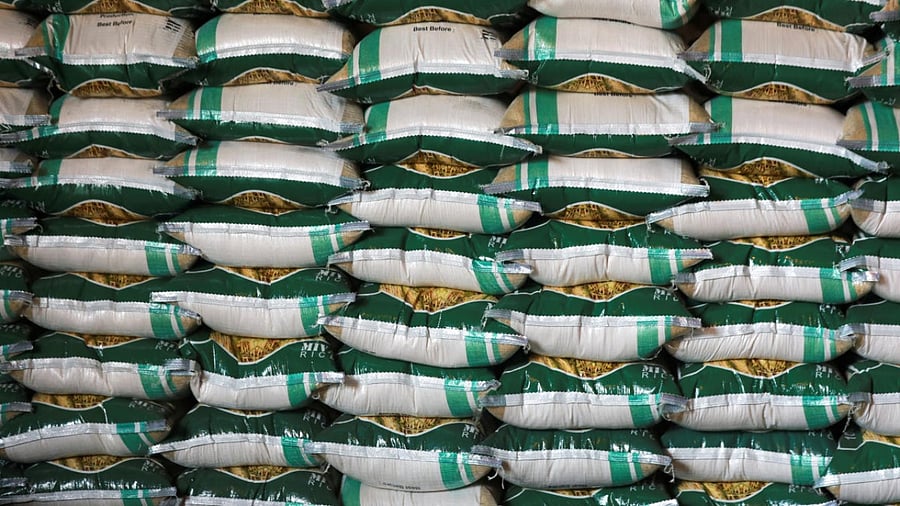
India's rice exports could fall by 40-50 lakh tonnes this fiscal year due to imposition of ban on broken rice as well as export duty on non-basmati rice, except for parboiled grains, exporters said.
India, which commands 40 per cent share in the global rice trade, exported 2.12 crore tonnes of rice in 2021-22 fiscal as against 1.77 crore tonnes in the previous year. Before the Covid pandemic, the exports were 95.1 lakh tonnes in the 2019-20 fiscal.
During April-August period of the current financial year, the government data showed that the country has already exported 93.5 lakh tonnes as against 83.6 lakh tonnes in the year-ago period.
"The exports may fall to 1.6-1.7 crore tonnes in this financial year because of ban on broken rice and 20 per cent export duty," All India Rice Exporters Association (AIREA) former president Vijay Setia told PTI.
He said the country was exporting non-basmati rice for $380-400 per tonne, lower than the rate of shipments from other countries.
The price realisation is "expected to improve at par with our competitors" after these decisions, Setia said.
On Friday, food secretary Sudhanshu Pandey explained the rationale behind the ban on exports of broken rice.
There has been an "absolutely abnormal" rise in shipments of broken rice and the broken grains were also not available in sufficient quantity for animal feed as well as ethanol blending programme, Pandey had said.
"During April to August this fiscal, the export share of broken rice increased to 22.78 per cent as compared to the 1.34 per cent in the corresponding period of 2019-20," the secretary had said.
India exported 38.9 lakh tonnes of broken rice in 2021-22 fiscal and out of that China imported 15.8 lakh tonnes.
Exports of broken rice stood at 20.6 lakh tonnes in 2020-21, just 2,70,000 tonnes in 2019-20 and 12.2 lakh tonnes in 2018-19.
In April-August period of this fiscal year, the export of broken rice increased to 21.3 lakh tonnes from 15.8 lakh tonnes in the year-ago period.
"Export policy of broken rice ...is amended from 'free' to 'prohibited'," the Directorate General of Foreign Trade (DGFT) said in a notification dated September 8, 2022.
The notification comes into effect from Friday, September 9, 2022.
As per the DGFT notification, provisions under the Foreign Trade Policy 2015-2020 regarding the transitional arrangement shall not be applicable to this notification. It added that during September 9-15, certain consignments of broken rice will be allowed to be exported.
The government has made no policy change in parboiled rice so that farmers continue to get good remunerative prices. There is neither a ban nor customs duty on exports of basmati rice.
Shipments of basmati rice fell to 39.4 lakh tonnes in last fiscal from 46.3 lakh tonnes in 2020-21. However, during April-August of this fiscal, the exports of premium basmati rice went up to 18.2 lakh tonnes as against nearly 17 lakh tonnes in the year-ago period.
In non-basmati category, exports of parboiled rice increased to 74.3 lakh tonnes in FY22 from 61.7 lakh tonnes in the previous fiscal, while shipments of non-parboiled rice rose to 52.1 lakh tonnes from 42.3 lakh tonnes.
The uptick in domestic wholesale and retail prices of rice was also one of the reasons cited by the government for imposing restrictions.
The wholesale prices have risen by 8 per cent to Rs 3,291 per quintal as on September 7 from Rs 3,041 per quintal a year ago, while the retail prices have gone up by 6.38 per cent to Rs 37.5 per kg from Rs 35.25 per kg.
Animal feed prices too have also gone up. Maize price increased from Rs 19 per kg on January 1, 2022 to Rs 24 per kg on September 8, 2022. Broken rice price has also increased from Rs 16 per kg to Rs 22 per kg during the same period.
On Thursday, the government imposed a 20 per cent export duty on non-basmati rice except for parboiled rice.
According to a notification by the revenue department, an export duty of 20 per cent has been imposed on 'rice in husk (paddy or rough)' and 'husked (brown) rice'. The export duty comes into effect from September 9.
The ban on broken rice and export duty of 20 per cent on non-basmati rice, expect for pa-boiled, have been imposed amid concern over likely fall in rice output.
The area under coverage for the paddy crop has declined by 4.95 per cent to 393.79 lakh hectare in the ongoing kharif season so far due to poor rains in some states, according to the agriculture ministry data released on Friday.
Paddy was sown in 414.31 lakh hectares (LH) in the year-ago period, the data showed. It is the main kharif crop and its sowing begins with the onset of the southwest monsoon in June and harvesting from October onwards.
India's total rice production during 2021-22 crop year (July-June) is estimated at a record 13.02 crore tonnes (11.17 crore tonnes in kharif and 1.85 crore tonnes in rabi season) as against 12.43 crore tonnes in the previous year.
The food ministry has said on Friday that the country's rice production in kharif (summer sown) could fall by 60-70 lakh tonnes but the country would still have surplus output.
The Centre is sitting on a stock of 4.7 crore tonnes of rice, including rice equivalent of unmilled paddy, as of July 1. The buffer stock requirement is to have 1.35 crore tonnes of rice as of July 1.